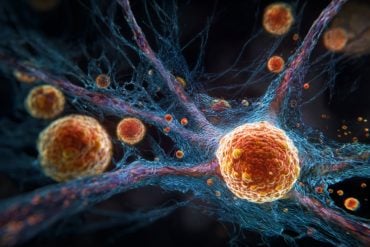Summary: Researchers discovered both immune system and central nervous system dysfunction in animal models and people with ALS4, a genetic, juvenile, and slow-progressing form of ALS.
Source: Mount Sinai Hospital
The immune system may play a fundamental role along with the central nervous system in amyotrophic lateral sclerosis (ALS), also known as “Lou Gehrig’s disease,” Mount Sinai researchers report.
Their study, published on June 22 in Nature, could have significant implications for diagnosing and treating the devastating neurodegenerative disease.
Until now, studies of ALS have focused on the central nervous system. But the Mount Sinai team reported both immune and nervous system dysfunctions in animal models and patients with ALS4, a juvenile and slowly progressive form of ALS, which is caused by mutations in the gene SETX.
“We learned that mutations in SETX need to be expressed in both the nervous and immune systems to generate motor impairment in mice, and that dysfunction in the adaptive immune system characterizes ALS4 in mice as well as humans,” says Laura Campisi, Ph.D., Assistant Professor of Microbiology at the Icahn School of Medicine at Mount Sinai, and co-lead author of the study with Ivan Marazzi, Ph.D., Associate Professor of Microbiology at Icahn Mount Sinai.
Further evidence of immune system involvement, she adds, was detected in the high concentration of CD8 T cells—which are usually involved in the destruction of tumors and cells in the body that harbor pathogens—in the spinal cord and peripheral blood of ALS4 mice and patients. Those increased CD8 T cell populations, known as TEMRA (terminally differentiated effector memory), correlate with ALS4 disease progression.
ALS is characterized by the progressive death of motor neurons, which severely impacts the functional ability of patients in a host of ways, including preventing the movement of arms and legs, speech, swallowing, and, eventually, breathing. There is no treatment or cure for ALS.
Researchers have focused their efforts over the years on neurons, though more recent studies have shown evidence of interaction between the central nervous and immune systems, long considered separate compartments.
The Mount Sinai study, in collaboration with neurobiologist Albert La Spada, MD, Ph.D., from the University of California, Irvine, is one of the first to address whether the adaptive immune system, which builds up the body’s protection as it is exposed to foreign pathogens, could be linked to some forms of ALS.

“There is a great need to understand if neurodegeneration is caused or aggravated by immune dysfunction,” explains Dr. Campisi.
For their study, researchers analyzed mice and human samples with state-of-the-art technologies like mass and spectral cytometry and single-cell sequencing.
“Our finding that peculiar immune signatures distinguish different forms of ALS could be significant for designing ‘personalized’ treatments tailored to specific subgroups of patients,” she notes.
An added advantage is that dysfunctional CD8 T cells linked to ALS4 can be detected in the peripheral blood, which is easily accessible compared to cerebrospinal fluid, which requires an invasive procedure for collection.
Another observation by the Mount Sinai team—that TEMRA CD8 T cells associated with ALS4 protect mice against glioma, a type of cancer that occurs in the brain—opens the door to further therapeutic research in this area.
“Our discovery of a link between the immune and central nervous systems in ALS4 disease has immediate implications for other types of ALS, other neurodegenerative disorders, and for cancer,” said Dr. Marazzi.
“In addition to making important inroads into the pathogenesis of ALS, our work underscores the pioneering work of Mount Sinai researchers in the fields of neuroscience and immunology.”
About this ALS research news
Author: Press Office
Source: Mount Sinai Hospital
Contact: Press Office – Mount Sinai Hospital
Image: The image is in the public domain
Original Research: Closed access.
“Clonally expanded CD8 T cells characterize amyotrophic lateral sclerosis-4” by Laura Campisi et al. Nature
Abstract
Clonally expanded CD8 T cells characterize amyotrophic lateral sclerosis-4
Amyotrophic lateral sclerosis (ALS) is a heterogenous neurodegenerative disorder that affects motor neurons and voluntary muscle control.
ALS heterogeneity includes the age of manifestation, the rate of progression and the anatomical sites of symptom onset. Disease-causing mutations in specific genes have been identified and define different subtypes of ALS.
Although several ALS-associated genes have been shown to affect immune functions, whether specific immune features account for ALS heterogeneity is poorly understood. Amyotrophic lateral sclerosis-4 (ALS4) is characterized by juvenile onset and slow progression.
Patients with ALS4 show motor difficulties by the time that they are in their thirties, and most of them require devices to assist with walking by their fifties. ALS4 is caused by mutations in the senataxin gene (SETX).
Here, using Setx knock-in mice that carry the ALS4-causative L389S mutation, we describe an immunological signature that consists of clonally expanded, terminally differentiated effector memory (TEMRA) CD8 T cells in the central nervous system and the blood of knock-in mice. Increased frequencies of antigen-specific CD8 T cells in knock-in mice mirror the progression of motor neuron disease and correlate with anti-glioma immunity.
Furthermore, bone marrow transplantation experiments indicate that the immune system has a key role in ALS4 neurodegeneration. In patients with ALS4, clonally expanded TEMRA CD8 T cells circulate in the peripheral blood.
Our results provide evidence of an antigen-specific CD8 T cell response in ALS4, which could be used to unravel disease mechanisms and as a potential biomarker of disease state.






